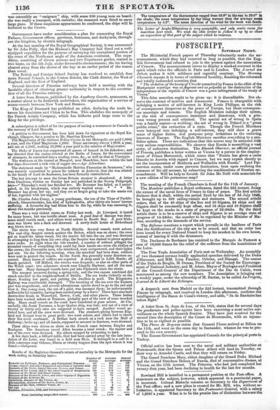POSTSCRIPT.
SATURDAY NIGHT.
The Ministerial French papers of Thursday reluctantly make the an- nouncement, which they had reserved as long as possible, that the Eng- lish Government had refused to join in the protest against the annexation of Cracow. The announcement serves to display a marked contrast in the spirit which rules the officials in Paris and in London. The Jcurnal des Debuts makes it with mildness and regretful courtesy. The Morning Chronicle repeats it in terms of embittered hostility, flaunting the reiterated and totally unfounded assertion that "The violation of the treaty of Utrecht committed by France in the affair of the Montpensier marriage was as flagrant and as palpable as the destruction of the independence of the republic of Cracow was a gross infringement of the treaty of Vienna."
This false assertion ought to be given up: it is discreditable. But ob- serve the contrast of motives and demeanour. France is chargeable with, indulging a motive of self-interest in King Louis Philippe, at the risk of consequences dangerous to the peace of Europe, but those consequen- ces uncertain and remote. The English Ministers indulge their spleen, at the risk of consequences imminent and disastrous, with a grie- vous wrong present and criminal. The special act of wrong in Spars was a family matter—a wedding; the act of wrong in Poland is a "great public crime," the extinction of a state. Though the French Ministers were betrayed into indulging a self-interest, they still show a grave sense of higher duties, and postpone petty irritations to the enduring interests of Europe. The English Ministers sacrifice everything to a pro- fitless spleen. There are indications that this course may be attended with very serious responsibilities. We observe that Russia is assembling a vast army, of unknown destination. The Rhenish Observer, an official journal of Prussia, publishes a letter written at Vienna by a person in the employ- ment of Prince Metternich, which states that "Russia has given a carte blanche to Austria with regard to Cracow, but we may expect shortly to see the incorporation of Moldavia and Wallachia with Russia." Lord Pal- merston seems, under some perverse fascination, bent upon realizing the romance of his old accuser, by subserving the machinations of Russian en- croachment. Will he help to furnish Sir John Mc Neill with materials for a new edition of his portentous map?


























 Previous page
Previous page